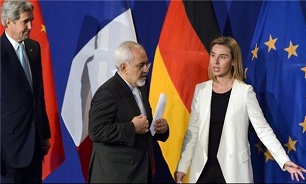Iranian President Firmly Rejects Renegotiation of N. Deal
 "The agreement is the result of years of efforts and months of negotiations between Iran and Europe and all sides should be committed to their nuclear deal undertakings and act upon them," President Rouhani said in a meeting with Spanish Minister of Foreign Affairs and Cooperation Alfonso Dastis in Tehran on Wednesday.
"The agreement is the result of years of efforts and months of negotiations between Iran and Europe and all sides should be committed to their nuclear deal undertakings and act upon them," President Rouhani said in a meeting with Spanish Minister of Foreign Affairs and Cooperation Alfonso Dastis in Tehran on Wednesday.
He underlined that there is no need for renegotiating the deal, and said, "The Islamic Republic of Iran will remain committed to the nuclear deal as long as the other side acts upon its undertakings."
Elsewhere, President Rouhani underscored the need for all countries to feel responsible for establishing long-term security in the region.
He also warned of the danger of arms race in the region, and said, "All countries should remain committed not to turn the region into a cache of ammunition."
Dastis, for his part, stressed the EU's full support for continued implementation of the nuclear deal, and said, "Spain and (other) EU member states attach importance to the expansion of ties with Iran and we can consolidate our relations through the survival of the nuclear deal."
Iranian Foreign Minister Mohammad Javad Zarif had warned last September that if the US and other states party to the deal defy their undertakings, Tehran would revive its halted or restrained nuclear activities with capabilities more advanced than the pre-agreement era.
“If Europe and Japan and Russia and China decided to go along with the United States, then I think that will be the end of the deal,” Zarif said in an interview with The Guardian and the Financial Times newspapers conducted in New York.
The Iranian foreign minister warned that if the agreement collapsed, Iran would emerge with a more advanced nuclear technology than the pre-nuclear deal era.
However, the top Iranian diplomat insisted that the technology would not be used to make weapons, in line with Tehran’s obligations under the nuclear Non-Proliferation Treaty (NPT).
“The deal allowed Iran to continue its research and development. So we have improved our technological base.
“If we decide to walk away from the deal, we would be walking away with better technology. It will always be peaceful, because membership of the NPT is not dependent on this deal. But we will not observe the limitations that were agreed on as part of the bargain in this deal,” he said.
Zarif stressed that Tehran would only abide by the restrictions under the nuclear deal, known as the Joint Comprehensive Plan of Action (JCPOA), if the other signatories – Britain, France, Germany, Russia and China – all remain committed to the deal and defy any subsequent US sanctions.
“Europe should lead,” Zarif said. “There are other options and those options will depend on how the rest of the international community deals with the United States,” he added.
